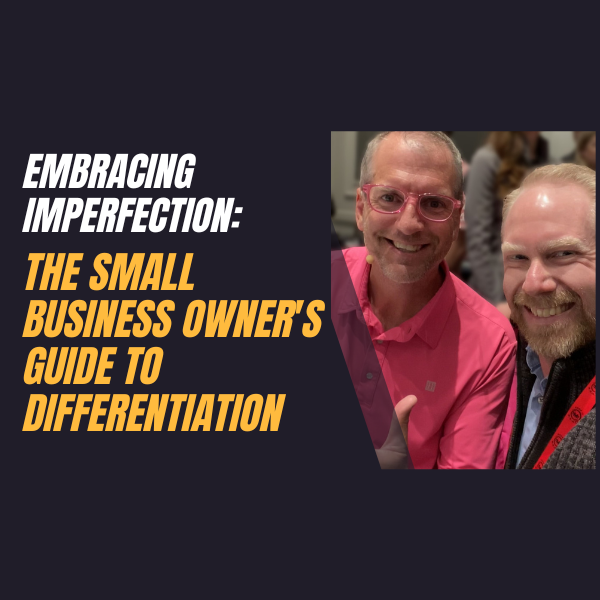
by Nathan Whittacre
In a world where businesses strive to be perfect, Dave Rendall, a dynamic speaker, presents a unique perspective that can be a game-changer for small business owners. During a recent conference, I had the privilege of listening to Dave Rendall's insightful talk on differentiation and the power of intentional imperfection. In this article, we will explore his key concepts and how they can benefit small business owners looking to stand out in a crowded marketplace.
Differentiation is Crucial
Dave Rendall begins by emphasizing the importance of differentiation in today's competitive business landscape. To truly succeed, it's not about being just another cookie-cutter business but about finding our unique identity and showcasing it proudly. Each of us has a unique background, talents, passions, and vision. By bringing out those different aspects in our businesses, we’re able to stand out from other companies and attract other businesses that have similar traits. Even if we’re selling to other businesses, we all interact with other people, not faceless companies. Dave teaches us to embrace what makes us unique and use that to make our companies different.
Embrace Imperfection
Rendall introduces the concept of "F.L.A.W.S.O.M.E." In his view, intentional imperfection can make our businesses more interesting and appealing to customers. He suggests that perfection may not be as captivating as we think, and it's time to break free from the shackles of flawlessness.
Flaunting
The first strategy Rendall discusses is "flaunting." This means openly displaying our imperfections. Buckley Cough Syrup's distinctive bad taste is a perfect example of flaunting a flaw. The Canadian based company knows that their cough syrup tastes bad, and they are proud of it! Rather than hiding the bad taste through marketing hype, they make it a mark of their brand. From their website: “You’re not the only one who thinks Buckley’s syrups taste like pine needles. In fact, that’s why people love us. With ingredients like ammonium carbonate, menthol, Canada Balsam and pine needle oil, we weren’t trying to make it taste good, we were trying to make it work. And it does.”
Lopsiding Imperfection
Another strategy he recommends is "lopsiding." Morgan Spurlock's "Super Size Me" documentary did a number on the fast-food industry when it came out in 2004. It showcased the harm of fast food to the human body through a social experiment of him eating all his meals at McDonald’s over a month-long period and tracked the negative health effects of it. Most fast-food chains started offering healthier options after the documentary came out, eliminating the worst parts of their menus. Dave talks about the decline of sales at many of those chains that went “healthy”.
Hardee’s went a different direction, embracing the worst of the industry. They introduced the “Monster Thickburger” clocking in at 1,420 calories! Hardee’s CEO said about the burger, “This is a burger for young hungry guys who want a really big, delicious, juicy, decadent burger. I hope our competitors keep promoting those healthy products, and we will keep promoting our big, juicy delicious burgers." Embracing the fat worked for them. “Since 2000, CKE's (Hardee’s and Carl Jr.’s parent company) average sales per store have increased by 31 percent, a rate greater than any other burger chain's, save for the nostalgia-mongering Sonic drive-ins, with which CKE is tied.”
Antagonizing Imperfection
Rendall also advocates "antagonizing" imperfection. He mentions the Alamo Drafthouse Cinema, which enforces strict rules about coming late, talking, texting, and bringing kids to the movies. This "imperfect" approach has gained them a loyal following. They share complaints from movie goers that got kicked out of the theater for breaking the rules on their website and advertising. These complaints bring people into the theater that want to follow the rules and enjoy a great watching experience.
Withholding Imperfection
Withholding, according to Rendall, is another way to make our businesses stand out. For instance, Chick-Fil-A's decision to be closed on Sundays is example of withholding, which has become an integral part of their brand.
Swerving, Opposing, and Micro Weirding
Rendall introduces several other strategies, including swerving, opposing, and micro weirding. Swerving means deliberately taking a different path from the norm. Opposing is exemplified by the Boerne 0.5k run, a humorous take on traditional marathons. Micro weirding involves creating memorable moments, much like the Magic Castle Hotel, which offers popsicles, free soda, and candies to its guests.
Exposing Imperfection
One of the most compelling points Rendall makes is about exposing imperfection. He argues that people are well aware that businesses aren't perfect, but businesses often try to hide their flaws. Rendall suggests that acknowledging and showcasing our imperfections can actually attract good customers. He references Snowbird Ski Resort's 1-star reviews, which they embrace with humor and authenticity.
Wabi Sabi
Rendall draws inspiration from the Japanese concept of "Wabi Sabi," which celebrates the beauty of imperfection in nature. We can create our businesses around the same concept and embrace the imperfections and differences that are created in our businesses.
Avoid the Crowds Altogether
In closing, Rendall advises small business owners not to try to stand out from the crowd but to avoid the crowds altogether. Instead of conforming to what's popular, focus on what makes our businesses unique and appealing to a niche audience.
Dave Rendall's ideas on embracing imperfection as a means of differentiation can be a refreshing approach for small business owners. By applying his strategies and thinking outside the box, we can create a distinctive and authentic brand identity that resonates with our target audience. In a world that often seeks perfection, remember that it's the imperfections that make our businesses interesting and relatable. So, let’s dare to be " F.L.A.W.S.O.M.E." and watch our small businesses flourish!







